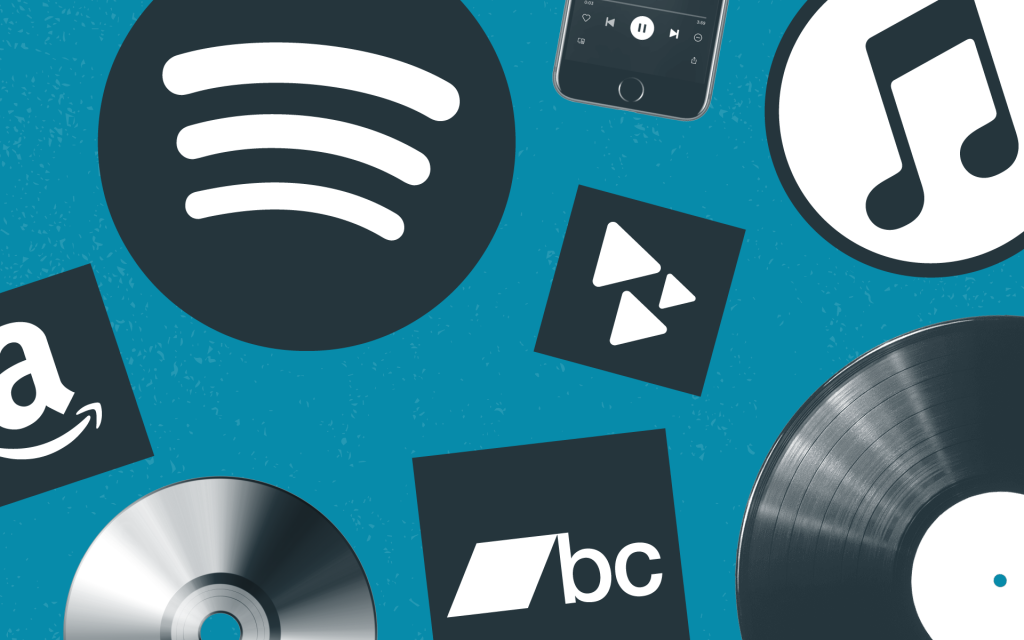Music distribution is the connection between your final version of your record and your future fans. Here is a complete guide about music distribution.
Distribution is a crucial part of music promotion. Brick and mortar music distributors used to be the only way for record labels and independent artists to bring their records to the hands of listeners.
However, digital music distribution has taken the center stage. Digital surpassed sales of physical mediums for the first time in 2015.
As an artist, digital distribution has become a must do activity to reach all your potential fans. Smart distribution grows your visibility. It allows your music to go into as many ears as possible. And it helps you get paid for your music.
So here is a complete guide you need to know about digital music distribution and the way to do it right.
How Digital Music Distribution Works: Then and Now
Traditionally, distributors got records into music stores and labels got people to go buy them (through promotion). Along the way, each of these middlemen took a percentage of the money.
This system still exists today. At least to some extent…
But the role of distributors and record labels has changed dramatically. Not to mention the changes the internet has brought in how people listen to music. People spend more time online, and less money on physical music.
Moreover, the resources and energy of physical distributors are often focused on top-selling records only. Smaller bands who sign to them get trapped in exclusive agreements that end up hindering their success.
That’s the reason why digital distribution has become an effective way to get your records out there, keep full rights to your music, and start building a name.
What Is Music Distribution?
Music distribution is the way music gets delivered to the listener. Traditionally, distributors enter agreements with record labels to sell to stores. However, digital distribution changed all of that process by cutting out the middleman—allowing artists to distribute music directly to online stores while keeping 100% of their royalties.
How Digital Music Distribution Works Today
The goal of digital distribution is to get your music on iTunes, Spotify, Google Play, and other musical streaming platforms and digital music stores.
Think of them like a digital record shop. When you get your music in them, people can listen to, download and buy your music. In exchange you receive royalties depending on how and where your music was listened to.
It seems like traditional record stores, digital music stores receive music from digital distribution companies. However, instead of shipping boxes of vinyl every week, digital distributors deliver digital music to the major music stores I mentioned above.
So what used to take weeks or months of shipping and manufacturing—not to mention a lot of upfront costs—is now as simple and fast as a couple of clicks.
The Best Music Distribution Companies
There are tons of companies that provide music distribution services out there. Keeping 100% of your royalties is key. Educate yourself on all their fees and what you’re getting into before you decide. Some say they don’t take a cut, but there are hidden fees in some cases. Do your research!
Here’s the best music distribution services and companies you can check:
- LANDR
- CD Baby
- TuneCore
- Ditto Music
- Loudr
- Record Union
- MondoTunes
- Reverbnation
- Symphonic
- iMusician
- The Orchard (they work with labels only)
- AWAL (selected applications only)
To know more about choosing your digital distributor, keep reading this article!
The Many Benefits of Digital Distribution
Why choose digital distribution?
Digital music sells the best, and will continue to rise. The revenues of the music industry make it clear – digital is the right way to go. Here are the global revenues of the industry in 2016:
- 50% from digital revenues
- 34% from physical format sales (CDs, vinyl, cassettes)
- 14% from performance rights (radio, shows, etc)
- 2% from Synchronization revenues (movies and ad syncs)
So be strategic. Make your music available where your fans actually spend time on: online. You’ll have more chance of reaching them.
Save the costs and hassle of physical distribution for youself – especially on a first album. Start your music journey by building an audience and a name with digital releases.
Plus, many digital distributors don’t have exclusivity deals. In another word, you’re not giving up the rights to your music. That’s huge. Because in case that your next record is better represented by another distributor, you’re free to end the non-exclusive agreement anytime.
There’s also added perks like recommendation algorithms. These might recommend your tracks to people based on what they listen to. That’s how people discover new music in the digital world!


